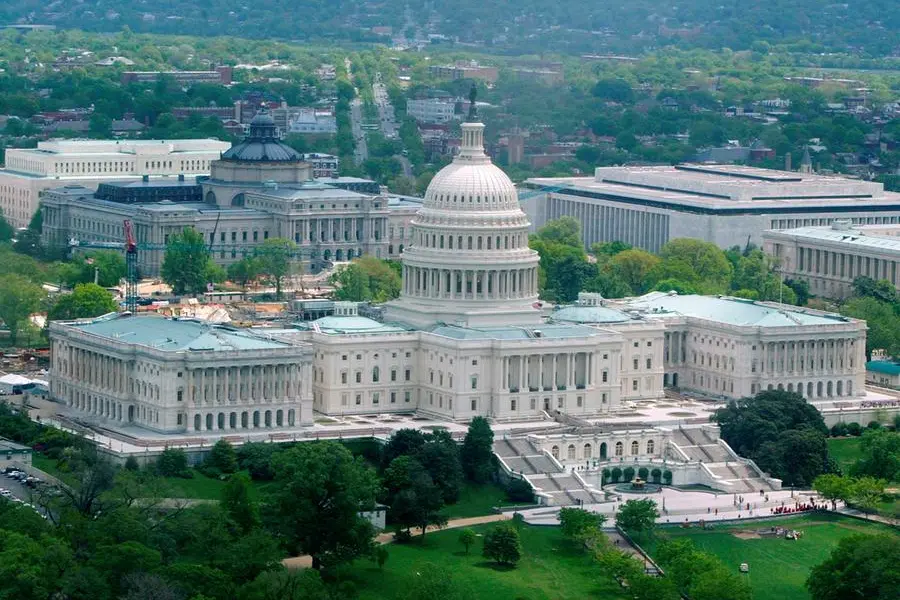PHOTO
WASHINGTON - The Republican-led House of Representatives has passed a sweeping budget package that would fulfill many of President Donald Trump's priorities. The Republican-led Senate is now considering the package and is likely to make significant changes.
Here is a summary of the major elements of the package, with cost estimates by the Congressional Budget Office or the Joint Committee on Taxation.
CBO estimates the bill would add $2.4 trillion to the $36.2-trillion debt over 10 years, reduce revenues by $3.67 trillion and cut spending by $1.25 trillion. The number of people without health insurance would increase by 10.9 million over that period due to changes to programs such as Medicaid.
TAX CUTS AND TAX BREAKS
Makes permanent the lower income tax rates in Trump's 2017 Tax Cuts and Jobs Act that are currently due to expire at the end of 2025. (Cost: $2.2 trillion)
Extends the increased alternative minimum tax exemption. (Cost: $1.4 trillion)
Extends the standard deduction and boosts it by an additional $1,000 to $1,500 until 2029. (Cost: $1.3 trillion)
Extends and increases tax break for owners of "pass-through" businesses, such as sole proprietorships and LLCs. (Cost: $809 billion)
Expands the Child Tax Credit to $2,500 from $1,000 until 2029, and keeps it at $2,000 after that, indexed to inflation. (Cost: $797 billion)
Raises the estate tax exemption from $14 million to $15 million. (Cost: $212 billion)
Extends tax breaks for multinational corporations. (Cost: $174 billion)
Exempts taxes on overtime pay until 2029. (Cost: $124 billion)
Creates a new $4,000 deduction for seniors. (Cost: $66 billion)
Exempts taxes on interest payments on loans for domestic autos until 2029. (Cost: $58 billion)
Exempts taxes on some tipped income until 2029. (Cost: $40 billion)
Exempts up to $5,000 for contributions to scholarship funds for private schools. (Cost: $20.4 billion)
Allows parents to contribute up to $5,000 tax-free each year to "Trump Accounts" to be used for a child's school and other costs when they reach adulthood. (Cost: $17.2 billion)
Allows taxpayers to deduct up to $40,000 for state and local tax (SALT) payments, up from $10,000 now, with benefits phasing out for households that make more than $500,000. (Would save $787 billion compared to an alternative scenario in which no limits were in place for this deduction.)
OTHER TAX CHANGES
Raises taxes on the biggest private university endowments from 1.4% to 21%. (New revenue: $22.6 billion)
Imposes a new 5% tax on funds sent by immigrants to their home countries. (New revenue: $22.2 billion) Eliminates taxes on firearm silencer sales and removes them from a national registry. (Cost: $1.4 billion)
Eliminates tax on gun manufacturers.
Gives the government power to end the tax-exempt status of "terrorist-supporting organizations."
MEDICAID
Requires able-bodied adults who have no dependents to work, volunteer or be in school at least 80 hours a month starting in 2027.
Bolsters verification efforts that check whether participants and healthcare providers are eligible to participate, and removes rules that make it easier to enroll.
Excludes non-citizens from the program and penalizes states that use their own funds to provide coverage to illegal immigrants.
Blocks regulations that required minimum staffing levels at nursing homes and other long-term care facilities.
Prohibits funding for gender transition therapies for minors.
Prohibits payments to large providers like Planned Parenthood that specialize in birth control, abortion and other reproductive health services.
Limits state taxes on providers that are used to raise the federal government's contribution.
Total Medicaid cuts: $785 billion
OTHER HEALTH
Restricts health benefits for some immigrants. (Savings: $117 billion)
Imposes stricter eligibility requirements for Affordable Care Act exchange coverage. (Savings: $82 billion)
ENERGY, ENVIRONMENT, COMMUNICATIONS
Ends tax breaks for electric vehicles.
Ends tax breaks for clean electricity and green energy.
Cancels funding for green-energy grant programs in the 2022 Inflation Reduction Act, including vehicle manufacturing, home efficiency upgrades, electricity transmission, wind power.
Creates incentives for pipelines, natural gas exports and exploration.
Repeals grant programs for purchasing electric heavy-duty vehicles.
Repeals grants to reduce air pollution, greenhouse gas emissions.
Repeals fuel-efficiency standards for automobiles and pickup trucks.
Makes more electromagnetic spectrum bands for communication available for auction.
Prohibits states from regulating artificial intelligence.
HOMELAND SECURITY
Border wall construction
Surveillance towers, drones and other border-security equipment
Increase staffing at U.S. Customs and Border Protection from 46,400 to 55,000
Increase law enforcement protection of the president
Reimburse states for border-security costs.
Total cost: $79 billion
IMMIGRATION AND JUSTICE
Imposes new fees of up to $5,000 for immigrants' work permits, court hearings, applications for asylum and other matters.
Provides funding to hire 10,000 new immigration enforcement officers, and funding for 1 million more deportations.
Provides additional funds for government agencies to investigate visa fraud, run criminal background checks and DNA testing, and supervise unaccompanied children.
Prevents federal courts from enforcing contempt citations related to injunctions or temporary restraining orders against the government.
Total savings: $110 billion
MILITARY
Increase spending on shipbuilding (Cost: $32 billion)
Air and missile defense (Cost: $24 billion)
Munitions (Cost: $19.5 billion)
Nuclear weapons (Cost: $12.6 billion)
Border security (Cost: $5 billion)
Total cost: $144 billion
FOOD ASSISTANCE
Increased work requirements for some of the 41 million participants in the SNAP food aid program
Shift some costs from federal government to states starting in 2028
Savings: $238 billion
EDUCATION
Changes student loan repayment plans (Savings: $295 billion)
Imposes borrowing limits for some student loan programs (Savings: $51 billion)
Tightens eligibility for Pell Grants (Savings: $8 billion)
Limits the government's ability to cancel student debt (Savings: $32 billion)
Total savings: $349 billion
(Reporting by Andy Sullivan; Editing by Scott Malone, Bill Berkrot, Alistair Bell, Andrea Ricci and Rod Nickel)





















